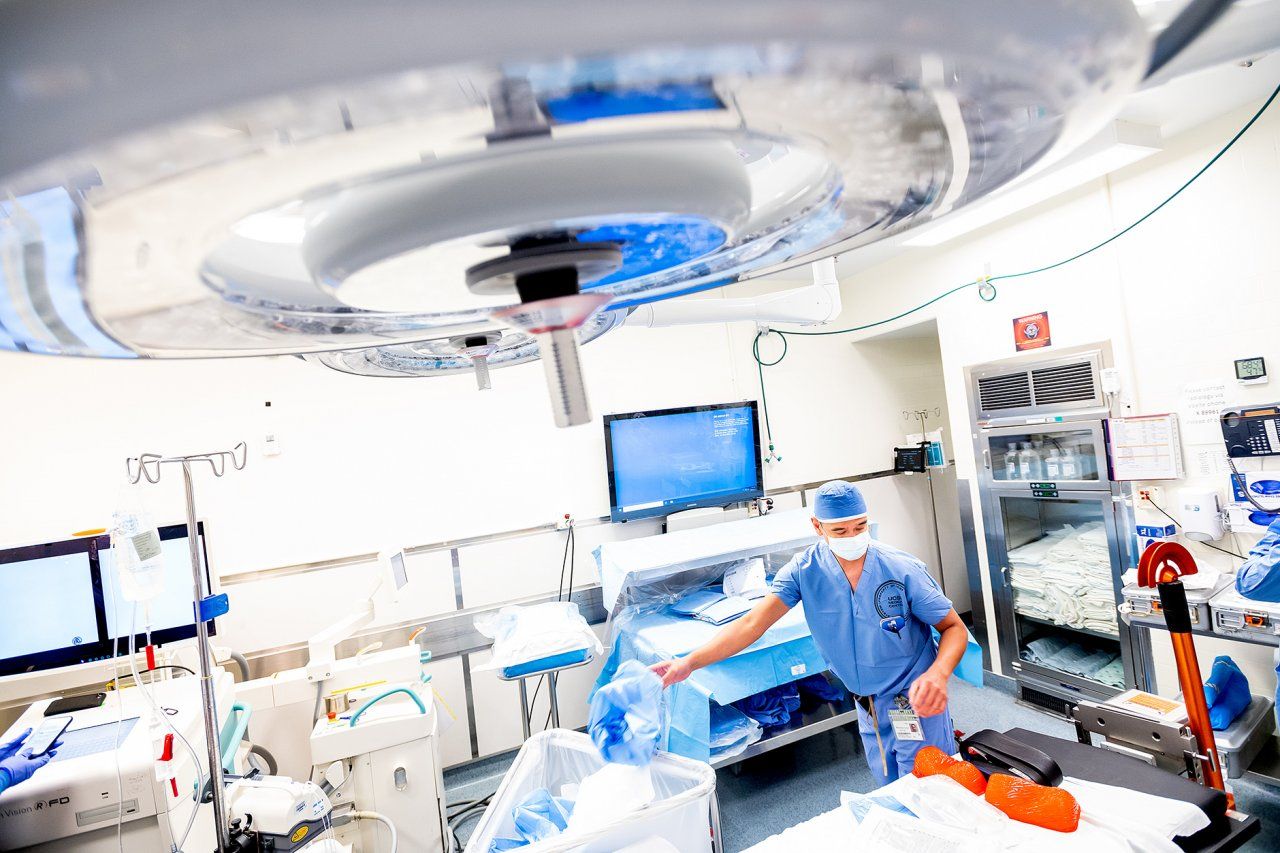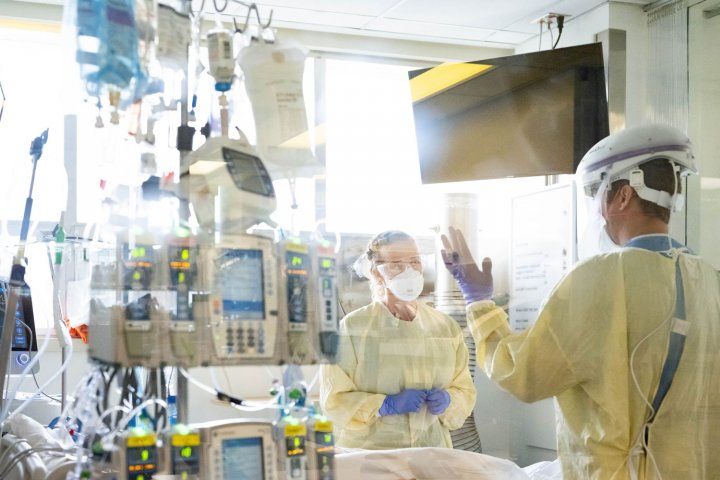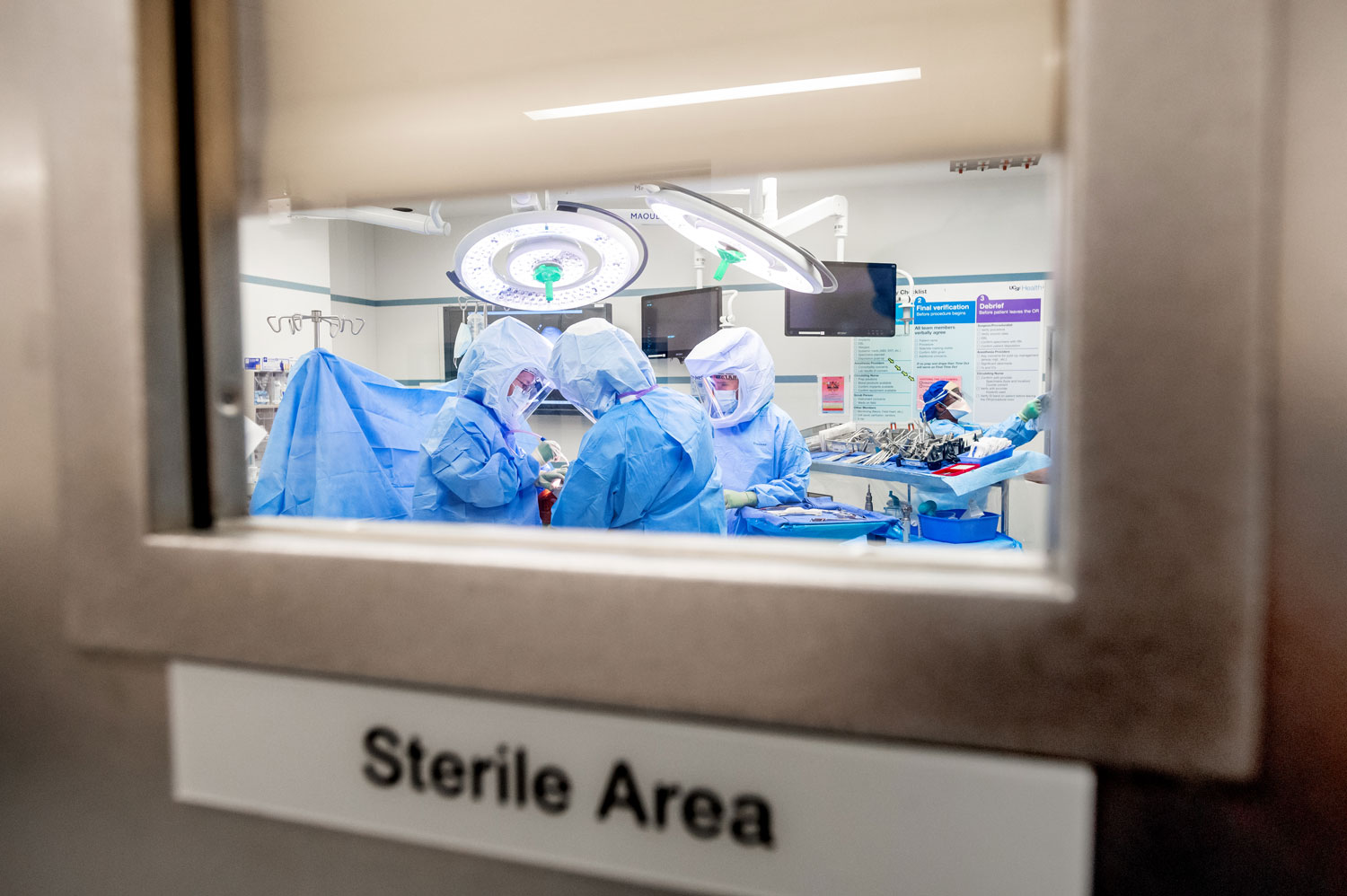UCSF Medical Center at Mount Zion - a hospital with a deep local history and a community feel - has been renovated and reopened as the new hub of UC San Francisco's adult orthopedic surgery services, offering patients expanded access to orthopedic specialty care.
The newly expanded inpatient surgery center coincides with a revitalization of the Mount Zion campus and demonstrates the critical role the hospital plays in UC San Francisco's current and future efforts to meet the health care needs of the Bay Area.
The specialty center, which complements other medical services available at Mount Zion, will be the first in the region to focus specifically on caring for patients with orthopedic issues and will fill an important health care need as the aging population grows. The hub also complements outpatient services at the UCSF Orthopaedic Institute at Mission Bay and complex inpatient care at the Spine Center at Parnassus Heights.

Bryan Roque, RN, prepares an operating room in the orthopedic surgery unit of UCSF's Mount Zion campus on Tuesday, Oct. 5. Photo by Noah Berger
"Mount Zion has such a rich history of being a high-touch place, where patients feel welcome and feel that they are part of a community," said Christopher Holland, Mount Zion's executive director and site administrator. "My goal is to make sure we maintain that at Mount Zion."
In a way, said Rita Ogden, chief of staff for the chief operating officer of UCSF Health, the reopening of Mount Zion as an inpatient hospital was a small silver lining in the COVID-19 pandemic.
When the new $1.5 billion UCSF Medical Center at Mission Bay opened in 2015, joining Mount Zion and UCSF Helen Diller Medical Center at Parnassus Heights, a third UCSF adult inpatient hospital at Mount Zion appeared to no longer be needed.
"Nobody expected Mission Bay to fill up as fast as it did," Ogden said.
Responding to the Pandemic
When COVID-19 began to spread in California in April 2020, Mount Zion sprang into action. A seven-bed intensive care unit and two acute care units, with 28 and 18 beds, respectively, opened April 29, 2020, providing capacity in case of a surge. But San Francisco's fast actions to "flatten the curve" and slow the pandemic meant that much of that capacity was not needed.

Staff at the UCSF Mount Zion 4West ICU treat COVID and non-COVID patients, as the population in Intensive Care at the COVID-dedicated ICU transitions to a post-pandemic unit. Photo by Susan Merrell
With UCSF's hospitals in Mission Bay and at Parnassus Heights operating near capacity and facing increasing demand, UCSF Health looked for where it could add capacity and saw the newly reopened rooms at Mount Zion as the perfect opportunity.
That's where orthopedics came in. UCSF orthopedic surgery has long needed more room to grow and expand its services. Mount Zion provided an opportunity to meet that need and increase capacity for other services at the same time. Additionally, Mount Zion has a history of providing high quality orthopedic services. Benjamin Ma, MD, vice chair of adult clinical operations in the Department of Orthopaedic Surgery and part of the team that led the transition to Mount Zion, performed his first surgery at Mount Zion when he arrived at UCSF in 2003. "It means a great deal to me in terms of my career," he said.
"The opportunity arose because of COVID to decant cases away from the Parnassus campus," Ma said. "Parnassus was so busy. It was always congested. It was not sustainable."
Dedicated Home for Orthopedics and Medicine
Orthopedics has moved most of its inpatient surgical operations to Mount Zion, including hip, knee and shoulder replacements, trauma surgeries, and hand, foot and ankle surgeries, Ma said. Complex spine surgery will stay at Parnassus.
The result of this transition serves patients on all of UCSF's campuses. Orthopedics now has a dedicated home at Mount Zion where it can continue to grow, and the surgical services at Parnassus have room to meet growing patient demand, including neurosurgery, which can also expand thanks to the newly freed up space.
Mount Zion has such a rich history of being a high-touch place, where patients feel welcome and feel that they are part of a community. My goal is to make sure we maintain that at Mount Zion.
Specialty centers tend to have better patient experience and quality of care. Orthopedics will occupy one surgical unit at Mount Zion, Ma said, which will offer patients improved access and simplify coordination of care. It will have a team of dedicated nurses, physical therapists and others to ensure patients get coordinated care and recover quickly.
"The care is more focused and more specialized," Ma said. "This will improve patients' outcome and their satisfaction. I know the patients and the practitioners at Mount Zion are happier. The hours are more predictable, the surgeries are more enjoyable, and we all work as a team together."
The medicine team will also have additional capacity on one unit at Mount Zion for patients who need hospitalization without surgery for illnesses such as pneumonia or COVID-19.
"We've worked hard to expand our support services," Holland said. Mount Zion has added respiratory therapy, rehabilitation therapy and dialysis, among other services, to make itself into a fully functioning hospital again. Its cafeteria will soon be open for longer hours to meet demand.
"Mount Zion reopening as an inpatient hospital has provided UCSF Health with a significant increase in capacity," Holland said. "Mount Zion plays a critical role in fulfilling UCSF Health's 2025 vision as a leading complex care provider and a destination for tertiary and quaternary care in the Bay Area."
A Century of Innovation for Its Community
UCSF acquired Mount Zion in 1990, more than a century after its founding as San Francisco's Jewish hospital. The history, including details on some of Mount Zion's groundbreaking innovations, is commemorated in a lobby display, newly installed as part of the hospital's renovations.
Over the years, the Mount Zion campus expanded to include several buildings flanking Divisadero Street, between Bush Street and Geary Boulevard, including the Helen Diller Family Comprehensive Cancer Center, the Osher Center for Integrative Medicine, and the Women's Health Center, Northern California's only nationally designated Center of Excellence in Women's Health.
Under UCSF's stewardship, Holland said, Mount Zion keeps that tradition of moving health care forward.

Dr. Erdan Kayupov, left, performs a knee replacement in the orthopedic surgery unit of UCSF's Mt. Zion campus on Tuesday, Oct. 5, 2021, in San Francisco. Photo by Noah Berger
"By creating a culture of innovation at Mount Zion and having our staff and providers take ownership of improvement work, we can improve the patient experience and increase engagement among our people," Holland said. "We can do things differently and try something new. When it's successful, it can spread to other parts of the organization.
Some examples include looking at different telemetry options, including considering a wearable patch, as well as using iPads in rooms so patients with COVID-19 could communicate with their families.
"If it works, we may see it everywhere," Holland said. "If not, we'll try the next thing. Mount Zion is a place of innovation. We try things out. We'll research, adjust, and continue to push ourselves to find new ways to care for patients and improve the patient experience. Our goal is to do it first and do it best."






